

Sobrevivendo na Ciência. Vamos começar pelo básico: o que é a ciência?
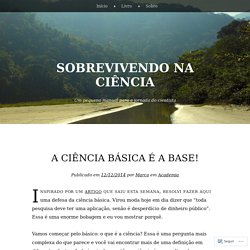
Essa é uma pergunta mais complexa do que parece e você vai encontrar mais de uma definição em diferentes fontes. Indo à raiz da questão, a ciência é uma cultura humana, assim como várias outras. Sendo mais específico, ela é uma das grandes culturas humanas transnacionais e transtemporais que visam entender o mundo. What Is Science? From Feynman to Sagan to Asimov to Curie, an Omnibus of Definitions. By Maria Popova “We live in a society absolutely dependent on science and technology,” Carl Sagan famously quipped in 1994, “and yet have cleverly arranged things so that almost no one understands science and technology.
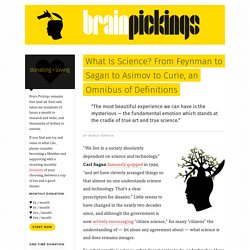
That’s a clear prescription for disaster.” Little seems to have changed in the nearly two decades since, and although the government is now actively encouraging “citizen science,” for many “citizens” the understanding of — let alone any agreement about — what science is and does remains meager. "What is Science?" What is Science? In last week's Tribune, there was an interesting letter from Mr.
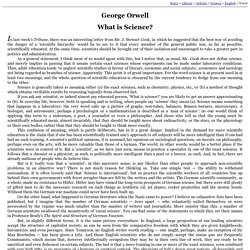
J. Stewart Cook, in which he suggested that the best way of avoiding the danger of a ‘scientific hierarchy’ would be to see to it that every member of the general public was, as far as possible, scientifically educated. At the same time, scientists should be brought out of their isolation and encouraged to take a greater part in politics and administration. As a general statement, I think most of us would agree with this, but I notice that, as usual, Mr. Cook does not define science, and merely implies in passing that it means certain exact sciences whose experiments can be made under laboratory conditions. Science - Wikipedia. Systematic enterprise that builds and organizes knowledge The Universe represented as multiple disk-shaped slices across time, which passes from left to right Modern science is typically divided into three major branches that consist of the natural sciences (e.g., biology, chemistry, and physics), which study nature in the broadest sense; the social sciences (e.g., economics, psychology, and sociology), which study individuals and societies; and the formal sciences (e.g., logic, mathematics, and theoretical computer science), which study abstract concepts.
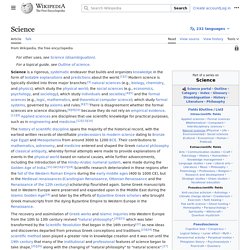
There is disagreement,[19][20][21] however, on whether the formal sciences actually constitute a science as they do not rely on empirical evidence.[22][20] Disciplines that use existing scientific knowledge for practical purposes, such as engineering and medicine, are described as applied sciences.[23][24][25][26] History Early cultures Classical antiquity.
What is science? The word "science" probably brings to mind many different pictures: a fat textbook, white lab coats and microscopes, an astronomer peering through a telescope, a naturalist in the rainforest, Einstein's equations scribbled on a chalkboard, the launch of the space shuttle, bubbling beakers ….
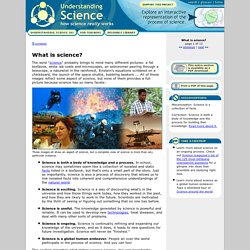
All of those images reflect some aspect of science, but none of them provides a full picture because science has so many facets: Science is both a body of knowledge and a process. In school, science may sometimes seem like a collection of isolated and static facts listed in a textbook, but that's only a small part of the story.
What is Science? Consider some examples.
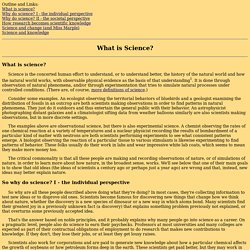
An ecologist observing the territorial behaviors of bluebirds and a geologist examining the distribution of fossils in an outcrop are both scientists making observations in order to find patterns in natural phenomena. They just do it outdoors and thus entertain the general public with their behavior. An astrophysicist photographing distant galaxies and a climatologist sifting data from weather balloons similarly are also scientists making observations, but in more discrete settings. The examples above are observational science, but there is also experimental science. A chemist observing the rates of one chemical reaction at a variety of temperatures and a nuclear physicist recording the results of bombardment of a particular kind of matter with neutrons are both scientists performing experiments to see what consistent patterns emerge. Science and Change (and Miss Marple) We can go back to Copernicus to illustrate this.
Science & the Scientific Method: A Definition. Science is a systematic and logical approach to discovering how things in the universe work.
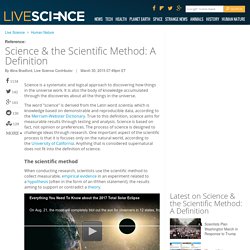
It is also the body of knowledge accumulated through the discoveries about all the things in the universe. The word "science" is derived from the Latin word scientia, which is knowledge based on demonstrable and reproducible data, according to the Merriam-Webster Dictionary. True to this definition, science aims for measurable results through testing and analysis. Science is based on fact, not opinion or preferences. The process of science is designed to challenge ideas through research.
When conducting research, scientists use the scientific method to collect measurable, empirical evidence in an experiment related to a hypothesis (often in the form of an if/then statement), the results aiming to support or contradict a theory. Everything You Need To Know about the 2017 Total Solar Eclipse The steps of the scientific method go something like this: Make an observation or observations. Related: Primata Falante.